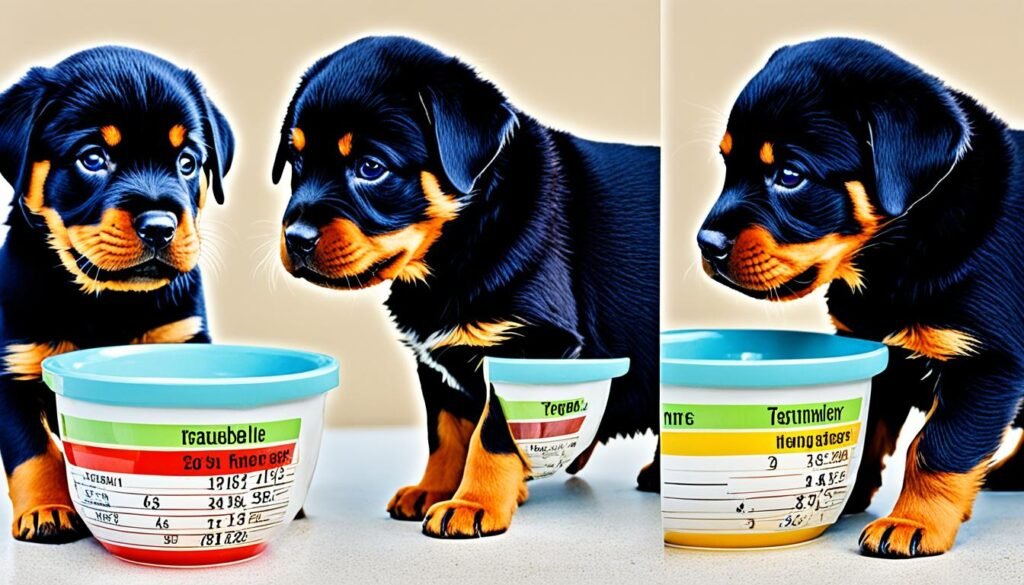When it comes to feeding a Rottweiler puppy, it’s important to provide them with the right portion sizes and nutrition for proper growth and development. As a responsible pet owner, you may have questions like “How much should a Rottweiler puppy eat?” or “What is the best diet for Rottweiler puppies?” This article aims to answer these questions and provide you with a comprehensive Rottweiler puppy feeding guide.
Feeding a Rottweiler puppy requires careful consideration of their nutritional needs, as they are large dogs with specific dietary requirements. Portion sizes should be appropriate to prevent obesity and ensure optimal health. Additionally, establishing a feeding schedule is crucial to maintain a healthy routine for your puppy.
In this guide, we will cover important topics such as recommended daily food intake, proper portion sizes, best diet options, and feeding tips for Rottweiler puppies. By following these guidelines, you can ensure that your Rottweiler puppy receives the necessary nutrients for their growth and well-being.
Key Takeaways:
- Proper portion sizes are crucial for Rottweiler puppies to prevent obesity and promote healthy growth.
- Feeding schedules should be established to maintain a routine and ensure consistent nutrition.
- Rottweiler puppies have specific nutritional needs that should be met with a high-quality diet.
- Regular monitoring of your puppy’s weight and adjusting their diet accordingly is important for maintaining a healthy weight.
- Consulting with a veterinarian can provide valuable guidance and recommendations for your Rottweiler puppy’s feeding plan.
What to Feed a Rottweiler Puppy
When it comes to feeding your Rottweiler puppy, it’s essential to prioritize their nutritional needs over specific diets. Whether you’re considering a raw diet, kibble, or wet food, the key is to ensure that the food provides a balanced combination of essential nutrients. These include calcium, phosphorus, protein, fat, fiber, and minimal carbohydrates.
Feeding your Rottweiler puppy a high-quality puppy food is highly recommended as it contains the necessary nutrients for their growth and development. Look for puppy foods specifically formulated for large breed puppies to meet their unique nutritional requirements. These foods often include ingredients like glucosamine and chondroitin to support joint health.
If you prefer to feed your Rottweiler puppy a raw or homemade diet, it’s important to consult with your veterinarian to ensure that the diet meets their nutritional needs. A raw diet should include a variety of raw meats, bones, and organ meats to provide the necessary protein, vitamins, and minerals while minimizing the risk of nutrient deficiencies.
Remember, feeding your Rottweiler puppy is not a one-size-fits-all approach. Each puppy is different, and their nutritional needs may vary. Regularly monitor their growth and consult with your veterinarian to ensure you’re providing the right food and portion sizes for your Rottweiler puppy’s optimal health.
Avoiding Underfeeding & Overfeeding
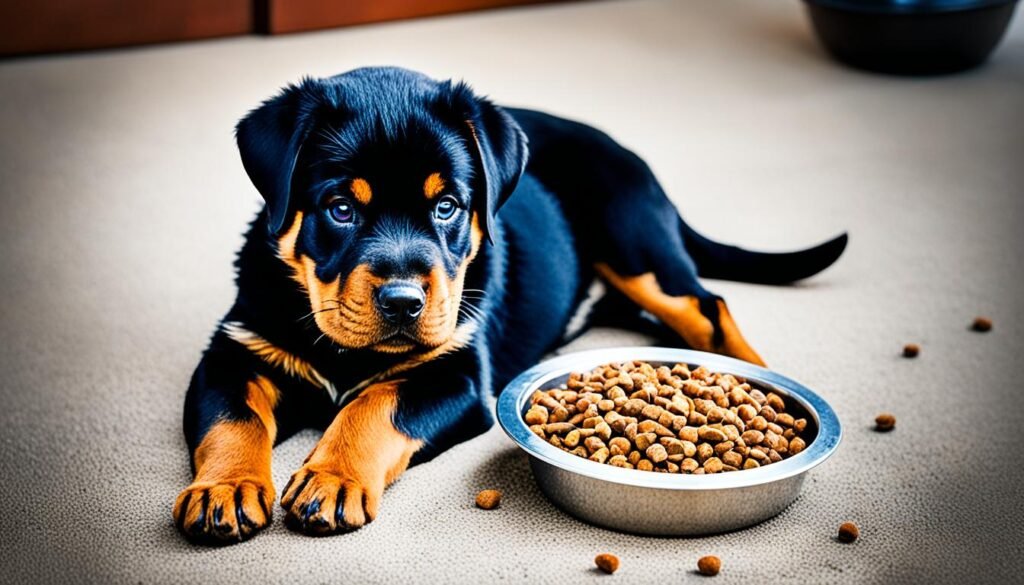
To prevent underfeeding or overfeeding your Rottweiler puppy, it’s important to have a proper feeding plan. You should be able to feel your puppy’s ribs with a slight padding, indicating a healthy weight. If the ribs are too prominent, it may mean your puppy is underfed, and you should increase their portion sizes. On the other hand, if there is excessive fat covering the ribs, it may mean your puppy is overfed, and you should reduce their portion sizes. Regularly monitoring your puppy’s weight and adjusting their diet accordingly can help maintain a healthy weight.
When to Switch From Puppy to Adult Food
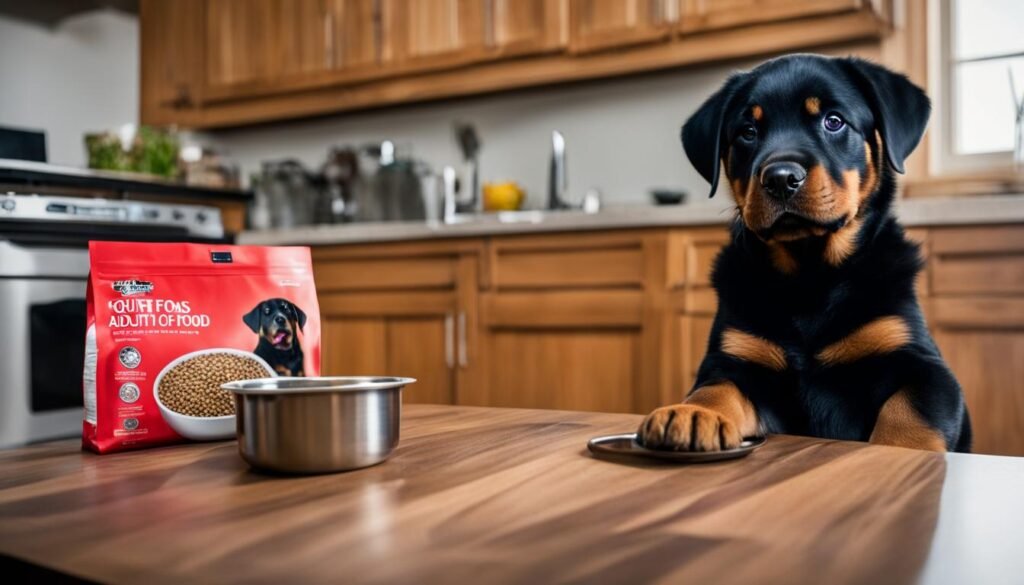
Transitioning from puppy food to adult food is an important milestone in your Rottweiler puppy’s development. It’s crucial to switch them at the right age to ensure they receive the appropriate nutrition for their growing needs. Here are some signs that indicate your Rottweiler puppy is ready for adult food.
- Age: Generally, Rottweiler puppies should be switched to adult food once they reach 18 to 24 months of age. By this time, they have usually reached about 90% of their adult height and weight.
- Growth: Assess your puppy’s growth rate and consult with your veterinarian to determine if they have achieved the appropriate size for a smooth transition to adult food.
- Dental Health: Adult dog food is formulated for fully developed teeth. If your puppy’s adult teeth have fully erupted, it may be a good time to switch to adult food.
- Energy Level: As Rottweilers mature, their energy levels decrease slightly. If you notice a decrease in your puppy’s energy and activity level, it may be a sign that they are ready for adult food.
- Stool Regularity: If your puppy’s stool is regularly firm and well-formed, it suggests that their digestive system is well-developed, making them ready for adult food.
When transitioning your Rottweiler puppy to adult food, it’s important to do it gradually to avoid digestive issues. Over a period of two weeks, gradually mix increasing amounts of the new adult food into their puppy food. This slow transition allows their digestive system to adapt to the new food without causing any discomfort.
When choosing adult food for your Rottweiler, opt for high-quality options that are specifically formulated for large breed dogs. Look for products that are rich in animal-based proteins, free from cheap fillers or animal by-products, and contain essential nutrients for their overall health and well-being.
By considering your Rottweiler puppy’s age, growth, energy level, dental health, and stool regularity, you can ensure a smooth transition from puppy to adult food. This will support their continued development and help them thrive into adulthood.
Why Won't My Rottweiler Puppy Eat?
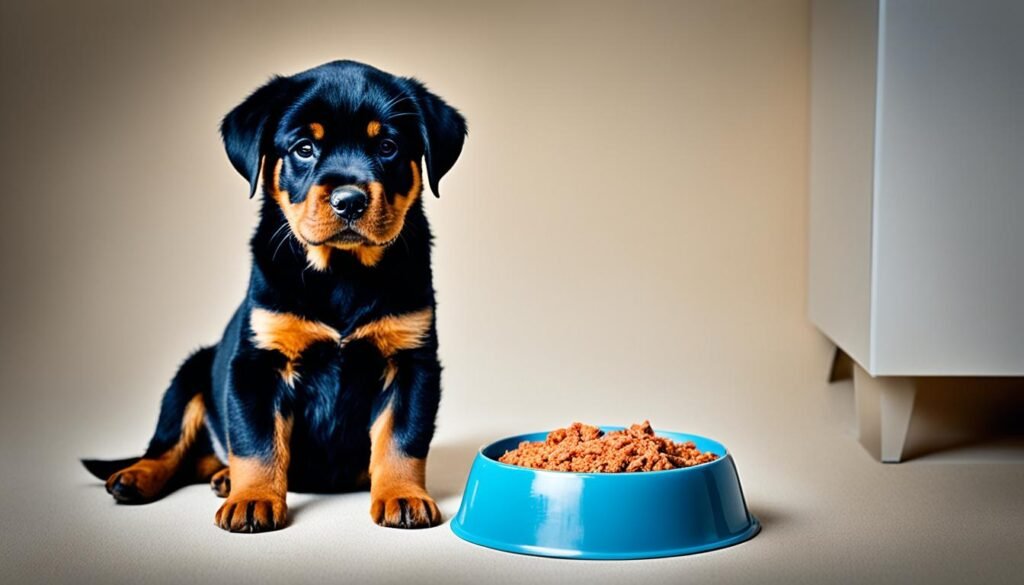
Rottweiler puppies may refuse to eat for various reasons. While some may simply have finicky eating habits or a dislike for their food, a loss of appetite can also be a sign of underlying medical issues.
There are several medical conditions that can cause a loss of appetite in Rottweiler puppies. These include:
- Parvovirus: This highly contagious viral infection affects the gastrointestinal tract, leading to severe vomiting and diarrhea.
- Distemper: Distemper is another viral disease that can cause symptoms such as fever, coughing, nasal discharge, and loss of appetite.
- Intestinal parasites: Worms such as roundworms, hookworms, and tapeworms can cause gastrointestinal discomfort and decreased appetite in puppies.
- Bloat: Also known as gastric dilatation-volvulus (GDV), bloat is a life-threatening condition that occurs when the stomach fills with gas and twists on itself.
- Ingested foreign body: Puppies are curious and may ingest objects that can block their digestive system, leading to loss of appetite.
If your Rottweiler puppy refuses to eat for more than a day or is accompanied by other concerning symptoms such as lethargy, vomiting, or diarrhea, it is crucial to consult your veterinarian immediately. They can properly diagnose the underlying cause of the loss of appetite and provide appropriate treatment.
Remember, a loss of appetite in Rottweiler puppies should never be taken lightly, as it may indicate a serious underlying health issue.
How Much to Feed an Adult Rottweiler
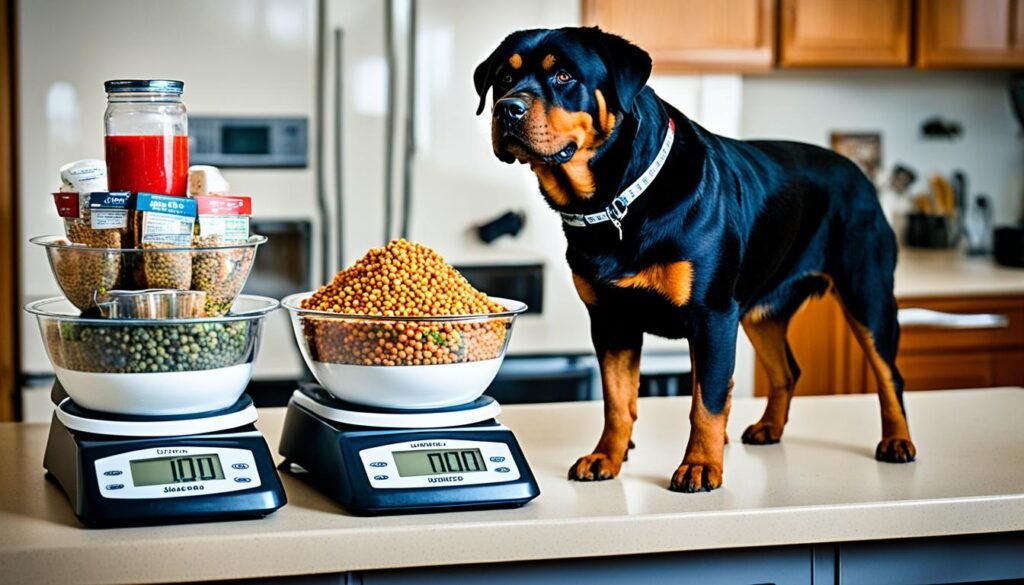
Feeding an adult Rottweiler involves considering factors such as their activity level, gender, and age. It is important to provide them with the right amount of food to maintain a healthy weight and overall well-being.
On average, adult Rottweilers should be fed between 4 and 6 cups of kibble per day, divided into two meals. This portion size can vary depending on the size and individual needs of your dog. Male Rottweilers may require slightly larger portions due to their typically larger size.
The recommended daily food intake for adult Rottweilers can be influenced by several factors. The activity level of your dog plays a crucial role in determining their calorie needs. If your Rottweiler is highly active or involved in activities such as agility training or working, they may require a higher calorie intake. Conversely, if your dog is less active or has a lower energy level, they may need a slightly lower calorie intake.
It is important to consult with your vet to determine the optimal feeding plan for your adult Rottweiler. They can take into account your dog’s specific needs, metabolism, and any additional factors that may influence their calorie requirements.
Providing your adult Rottweiler with the right amount of food is essential for maintaining their health and preventing issues such as obesity or malnutrition. Regularly monitoring their weight, adjusting portion sizes accordingly, and ensuring they have a balanced diet will contribute to their overall well-being and longevity.
- Feed your adult Rottweiler between 4 and 6 cups of kibble per day, divided into two meals.
- Consider your Rottweiler’s gender and size when determining portion sizes.
- Take into account your dog’s activity level when adjusting their calorie intake.
- Consult with your vet to determine the optimal feeding plan for your adult Rottweiler.
- Regularly monitor your Rottweiler’s weight and adjust portion sizes as needed.
Rottweiler Feeding Guide for Seniors
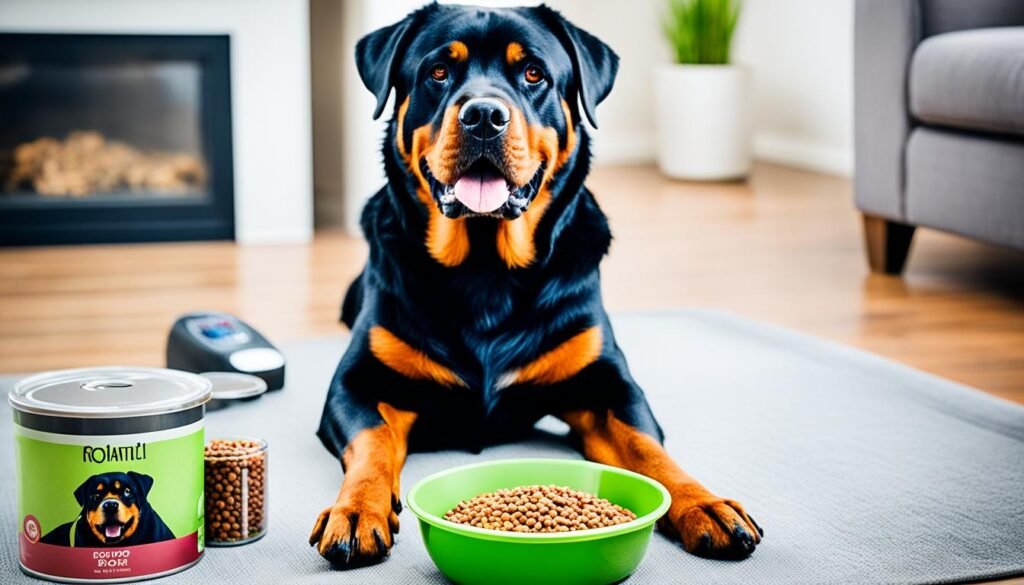
As Rottweilers age, their nutritional needs change, and it’s important to adjust their diet accordingly. Senior Rottweilers have different requirements compared to puppies and adult dogs. To ensure their health and well-being, here are some feeding tips and guidelines to consider:
- Choose Senior-Specific Dog Food: Opt for a high-quality senior dog food that is specifically formulated to meet the nutritional needs of older Rottweilers. Look for options that contain added glucosamine to support joint health and higher fiber content to aid with regularity.
- Portion Sizes: Due to reduced activity levels, senior Rottweilers may require smaller portion sizes compared to when they were younger. Consult with your vet to determine the appropriate portion sizes to maintain a healthy weight.
- Feeding Schedule: Older Rottweilers may benefit from fewer meals per day. It’s recommended to split their daily food intake into two or three meals to prevent overeating and aid digestion.
- Monitor Weight and Health: Keep an eye on your senior Rottweiler’s weight and overall health. Adjust their diet as needed to ensure they maintain a healthy weight and address any age-related health issues.
- Consult with a Vet: Every Rottweiler is unique, and their nutritional needs may vary. Consult with your vet for personalized recommendations and to address any specific dietary requirements or health concerns your senior Rottweiler may have.
By following these feeding guidelines and consulting with your vet, you can provide your senior Rottweiler with the appropriate nutrition to support their aging bodies and maintain their overall well-being.
Conclusion
Feeding a Rottweiler puppy requires careful consideration of their nutritional needs, portion sizes, and feeding schedule. Providing proper nutrition is essential for their growth and development. To ensure they receive the best possible nutrition, it is recommended to choose a high-quality puppy food that meets their specific dietary requirements.
Monitoring your Rottweiler puppy’s weight is important to maintain their health. Adjusting their portion sizes accordingly can prevent underfeeding or overfeeding. Regular consultation with a veterinarian can help you establish a feeding schedule and make informed decisions about your puppy’s diet.
Remember, every Rottweiler puppy is unique, so it’s crucial to consider important factors such as age, breed, and activity level when feeding them. By providing proper nutrition and following a feeding guide, you can support your Rottweiler puppy’s journey towards a happy and healthy life.
FAQ
How much should a Rottweiler puppy eat?
The amount of food a Rottweiler puppy needs depends on factors like age, breed, and activity level. It’s important to feed them the right amount to prevent obesity and ensure proper growth and development.
What should I feed my Rottweiler puppy?
When choosing what to feed your Rottweiler puppy, focus on meeting their nutritional needs rather than specific diets. Whether you choose a raw diet, kibble, or wet food, ensure that the food provides enough calcium, phosphorus, protein, fat, fiber, and minimal carbs.
How can I prevent underfeeding or overfeeding my Rottweiler puppy?
To prevent underfeeding or overfeeding, it’s important to have a proper feeding plan. You should be able to feel your puppy’s ribs with a slight padding, indicating a healthy weight. Regularly monitoring your puppy’s weight and adjusting their diet accordingly can help maintain a healthy weight.
When should I switch my Rottweiler puppy from puppy food to adult food?
Rottweiler puppies should be switched to adult food once they reach 18 to 24 months of age. It is important to wait until they have reached about 90% of their adult height and weight before making the switch. Gradually introduce the adult food by mixing it with their puppy food over a period of 2 weeks to avoid digestive issues.
Why won’t my Rottweiler puppy eat?
Rottweiler puppies may refuse to eat due to various reasons. It could be a result of finicky eating habits or dislike of their food. However, loss of appetite can also be a sign of underlying medical issues. If your puppy refuses to eat for more than a day or is accompanied by other symptoms like lethargy, vomiting, or diarrhea, it’s important to consult your vet to rule out any serious medical problems.
How much should I feed my adult Rottweiler?
On average, adult Rottweilers should be fed between 4 and 6 cups of kibble per day, divided into two meals. Male Rottweilers may require slightly larger portions. The exact amount of calories and portion sizes for individual dogs may vary depending on their specific needs and metabolism. Consult with your vet to determine the optimal feeding plan for your adult Rottweiler.
What should I feed my senior Rottweiler?
Senior Rottweilers have different nutritional needs compared to puppies and adult dogs. They may require a kibble with added glucosamine for joint health and higher fiber content to aid with regularity. It’s important to choose a high-quality senior dog food that meets their specific nutritional needs and consult with your vet for any specific dietary requirements.
